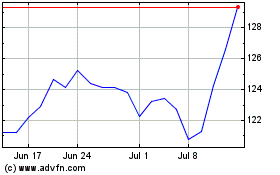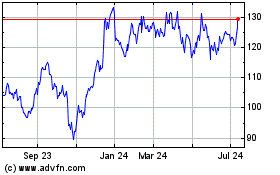Head of Goldman Sachs Private-Investing Business Leaving Firm--3rd Update
February 07 2020 - 4:24PM
Dow Jones News
By Liz Hoffman
The two heads of Goldman Sachs Group Inc.'s flagship
private-investing business quit Friday, the latest senior
departures at the Wall Street firm and ones that threaten to
undermine a big fundraising push.
Sumit Rajpal and Andrew Wolff jointly ran Goldman's $100
billion-plus merchant bank, which invests the firm's money and that
of clients into deals. They were elevated last spring to help
spearhead a big fundraising push, which aims to bring in another
$100 billion over the next five years.
Both men were set to hit the fundraising trail later this month
for the first plank, a planned $8 billion corporate-buyout fund,
people familiar with the matter said. That effort will continue
under fundraising chief Michael Koester, though executives are
likely to face tough questions from investors about turnover at the
top.
The resignations are a setback for Chief Executive David
Solomon's plans to compete head-to-head in private equity with
giants like Blackstone Group Inc. Seizing on growth in private
markets, Mr. Solomon has combined disparate investing groups across
the firm into a $320 billion colossus in buyouts, hedge funds, real
estate and debt.
What was a trickle of senior departures last fall has picked up
speed early in 2020. At least five partners quit this week and
several more are set to follow, many in the firm's trading arm,
people familiar with the matter said.
Some in the ranks have expressed unease about Mr. Solomon's
agenda, which has brought sweeping change and a higher level of
executive accountability to a firm unaccustomed to much of either.
To those on the wrong side of it, the shift de-emphasizes
activities like trading and engineering that have long been a core
part of Goldman's DNA.
Mr. Rajpal joined Goldman in 2000 and was named in 2010 as one
of its youngest-ever partners. He helped Goldman navigate changes
to private-equity rules after the financial crisis, and has been
behind some winning investments, including a deal for insurance
group Hastings and a stake in credit-reporting bureau TransUnion
that turned more than $1 billion in profit.
He had an early hand in building what is Goldman's consumer
bank, pitching then-CEO Lloyd Blankfein in 2014 on the idea. Today
Marcus, as the retail business is called, has $60 billion in
deposits and $7 billion in loans.
Mr. Wolff, a Harvard-trained lawyer, has spent 22 years at
Goldman, most of it tending to the merchant bank's overseas
operations. He spent six years in Asia before relocating to London
in 2012.
They stepped into the spotlight with a $7 billion buyout fund
raised in 2017, Goldman's first since the financial crisis and a
key test of whether the bank still had its mojo in merchant
banking. That fund is about 80% invested and has early returns in
the midteens, people familiar with the matter said.
It isn't clear what their next steps are. Departing Goldman
partners who aren't joining rivals often stay on as advisers to the
firm; those with competing offers are quickly cast off.
Write to Liz Hoffman at liz.hoffman@wsj.com
(END) Dow Jones Newswires
February 07, 2020 16:09 ET (21:09 GMT)
Copyright (c) 2020 Dow Jones & Company, Inc.
Blackstone (NYSE:BX)
Historical Stock Chart
From Aug 2024 to Sep 2024

Blackstone (NYSE:BX)
Historical Stock Chart
From Sep 2023 to Sep 2024
